Picture this: You’ve always been a whiz with numbers and technology. Coding felt like second nature, solving complex problems gave you an adrenaline rush.
But then came AI — that big, scary beast gobbling up jobs left and right. Is your job on the brink of extinction?
Well, hold on to your seats because we’re about to flip that script!
A wave of AI job opportunities is sweeping across various sectors.
Some of the artificial intelligence jobs on the rise include AI engineers, AI data analysts, software engineers, machine learning engineers, robotics engineers, natural language processing engineers, data scientists, computer vision engineers, AI product managers, AI writers/optimizers, AI research scientists, AI ethicists, and AI solution architects.
These roles cover a wide spectrum, and the cool part is that AI is still evolving, so there’s plenty of room for innovation and growth in these fields!
In this blog post, we’ll introduce you to AI job opportunities, the rising demand for AI professionals, salary expectations in the field, and what proficiencies are required to prepare you for a new career path.
AI isn’t just another tech buzzword; It’s your golden ticket to a world filled with fascinating challenges and rewarding experiences.
Table Of Contents:
- Navigating the AI Job Market
- The Rising Demand for AI Professionals
- Different Types of Entry-Level AI Job Opportunities
- Salary Expectations in the Field of AI
- Educational Background and Certifications for AI Careers
- Required Skills for Pursuing a Career in AI
- How to Prepare for a Career in Artificial Intelligence
- Challenges and Opportunities in AI Careers
- FAQs – AI Job Opportunities
- Conclusion
Navigating the AI Job Market
With the transformative impact of artificial intelligence across industries, the demand for skilled professionals in AI is soaring. If you’re eyeing a career in this dynamic realm, here’s your compass for navigating the AI job market.
Study the AI Ecosystem
Before diving in, it’s crucial to learn the diverse branches within the AI ecosystem. From machine learning and computer vision to natural language processing, each specialization offers unique opportunities. Assess your interests, strengths, and the areas of AI that captivate you the most.
Skill Development: Beyond the Basics
Building a strong foundation in programming languages like Python is a given, but AI demands more. Familiarize yourself with popular AI frameworks such as TensorFlow and PyTorch. Dive into statistical modeling, algorithm development, and data science.
Continuous learning is the key, so stay updated on the latest advancements and trends in AI.
Craft an AI-Centric Resume
Your resume is the gateway to landing an AI job. Highlight your relevant skills, projects, and achievements. Showcase practical applications of your AI knowledge – employers want to see how you’ve implemented theory into tangible solutions. Tailor your resume to mirror the specific requirements of the AI role you’re targeting.
Pro tip: BrandWell can help you build the perfect resume, thanks to its generative AI suite. You can either create a resume from scratch — just provide the AI with all your pertinent information — or copy-paste your existing resume and ask the AI to enhance it.
Build a Strong Portfolio
Your portfolio is your digital fingerprint. Develop a portfolio that not only showcases your technical skills but also demonstrates your problem-solving abilities. Include AI projects you’ve worked on, detailing the challenges faced and the innovative solutions you implemented.
Networking: Beyond the Virtual World
In the digital age, networking goes beyond LinkedIn connections. Attend AI conferences, workshops, and meetups. Engage in online forums and discussions. Connect with professionals in the field. Personal connections often open doors to opportunities that might not be advertised.
AI Certifications: Adding Value to Your Profile
Certifications validate your expertise and can set you apart in a competitive job market. Consider certifications from reputable institutions and platforms like Coursera and edX, or tech giants like Google and Microsoft. These credentials can act as a testament to your commitment and knowledge of AI.
Stay Adaptable: Embracing Continuous Learning
The AI landscape is a rapidly changing terrain. Embrace a mindset of continuous learning. Enroll in online courses, participate in webinars, and explore new AI tools. Employers are keen on candidates who not only possess current skills but also demonstrate a commitment to staying at the forefront of AI advancements.
Prepare for Interviews
AI job interviews often include technical assessments and problem-solving scenarios. Practice coding challenges, review algorithms, and be ready to discuss your thought process. Showcase your ability to approach complex problems and communicate your solutions effectively.
Explore Diverse Industries
AI is not limited to tech companies. Virtually every industry, from healthcare and finance to entertainment and agriculture, is integrating AI solutions. Explore opportunities in diverse sectors and consider how your AI skills can contribute to solving industry-specific challenges.
The AI job market is teeming with opportunities for those who are prepared, adaptable, and passionate about the potential of artificial intelligence. By navigating the AI job market strategically, honing your skills, and staying abreast of industry trends, you can position yourself not just to land a job but to thrive in the exciting world of AI.
The Rising Demand for AI Professionals
It’s no secret that the demand for AI professionals is skyrocketing. The reason? Businesses are recognizing the capability of AI to provide them with new opportunities and thus, they seek professionals who can help them realize this potential.
This isn’t just hype. A Gartner poll uncovered that 55% of organizations have increased their investment in generative AI in the last 10 months.
Why Do Companies Need AI Talent?
You might ask, “But why do companies need these skills?” It boils down to two things: innovation and competition.
Innovation because businesses realize they can use artificial intelligence to improve their operations, make better decisions, or create new products or services.
And competition because if one company starts using it successfully, others will feel pressured not just to catch up but to get ahead.
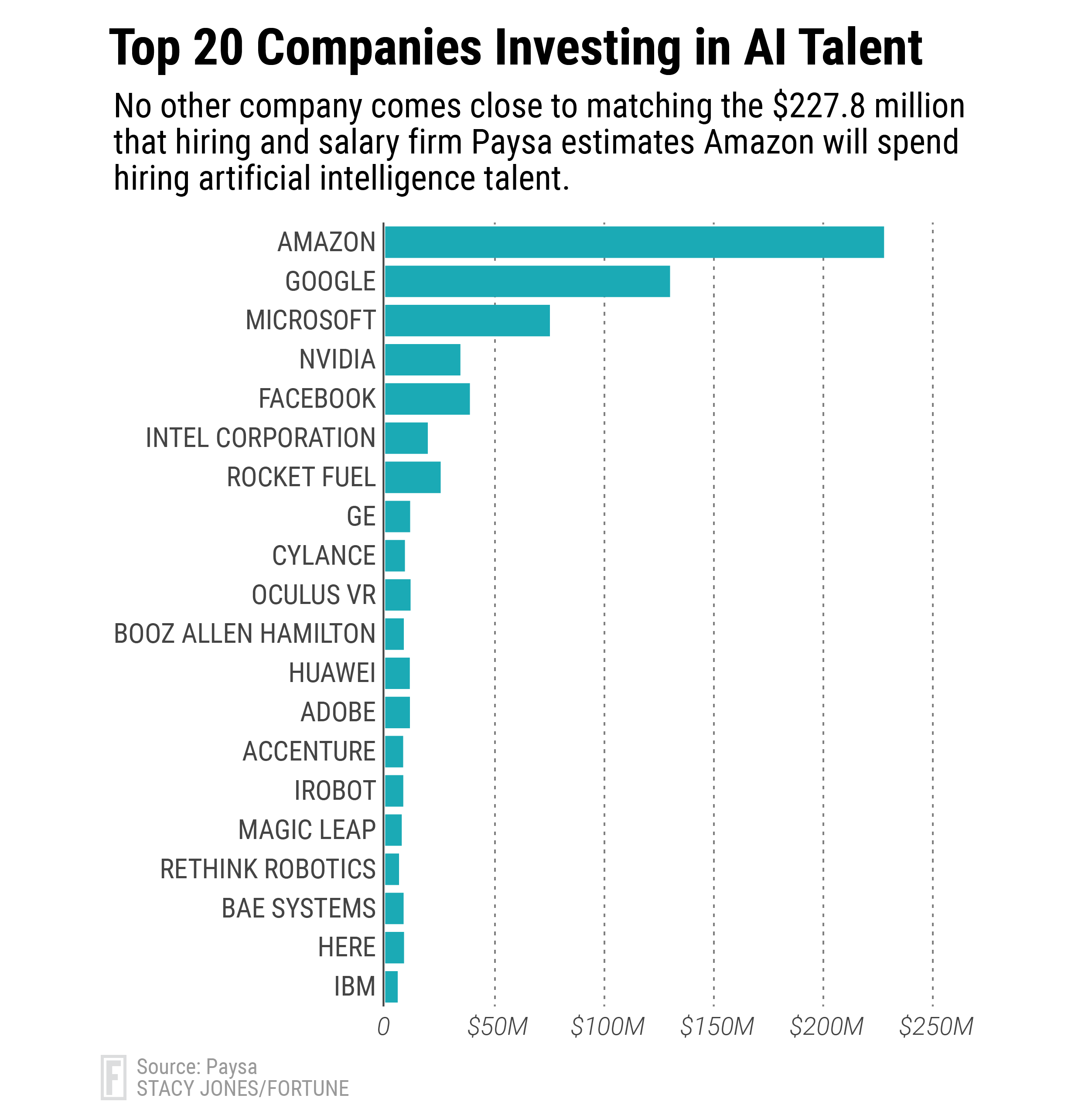
Source: Fortune
The Growth in Numbers
As you’d expect from such a trend, there has been a surge in job postings related to artificial intelligence over recent years. According to LinkedIn’s 2021 Jobs on the Rise Report, job postings for AI specialist roles had seen about 74% annual growth.
A Trend That’s Here To Stay
All signs point towards continued growth in demand for these skills as we move forward into an increasingly digital world where automation becomes commonplace across all industries.
So yes. Now could be a great moment to start or advance your career in this field.
Different Types of Entry-Level AI Job Opportunities
Artificial intelligence is a broad field, giving rise to various AI jobs. Each one demands unique skills and offers different opportunities. Let’s look at popular entry-level roles in artificial intelligence careers.
Data Scientist
A data scientist’s job revolves around analyzing large sets of data to extract actionable insights. They use advanced algorithms and statistical models, helping companies make data-driven decisions.
Entry-level data science roles involve working with more experienced data scientists to build and implement models. This role is perfect for those who have a strong background in statistics and programming, and a passion for uncovering insights from data.
Machine Learning Engineer
Machine learning engineers, the wizards behind self-driving cars, design systems that can learn from and make predictions based on data patterns.
In this role, you’ll work alongside more experienced engineers to develop, test, and deploy machine learning models. Practical experience with machine learning frameworks and a solid understanding of algorithms are essential.
NLP Specialist
The creators of Siri or Google Assistant are known as natural language processing specialists. They teach machines how humans communicate so we can chat with our gadgets seamlessly.
NLP engineers design processing systems that enable machines to understand language patterns. Their innovations led us into an era where our commands are understood effortlessly by voice assistants, thereby enhancing user experience significantly. They also work on refining existing tools apart from developing new ones.
Business Intelligence Developer
A business intelligence developer’s goal is to help businesses understand their data better. This way they identify new growth areas by spotting trends in complex datasets.
Software Engineer
Software engineers play a pivotal role in AI by developing new products and improving existing ones. They use programming languages like Python and Java to create everything from chatbots to shopping apps.
Data Engineer
Data engineers build the digital infrastructure necessary for storing the vast amounts of data required by modern AI systems. They develop, test, and maintain these storage architectures ensuring smooth functioning of all applications involved.
AI Support Specialist
As AI technologies become more prevalent, the need for support specialists who can assist users with AI applications is growing. This role involves troubleshooting, providing guidance, and ensuring smooth user experiences.
AI Software Developer
Entry-level software developers with a focus on AI work on creating and implementing algorithms and models. Proficiency in programming languages like Python and knowledge of AI frameworks are key for this role.
Robotics Engineer
Robotics engineers develop robotic systems that can perform tasks previously done by humans, using AI and automation. These range from picking up warehouse items to mopping floors, making work easier and more efficient.
AI Research Scientist
An AI research scientist plays an integral role in studying and developing AI technologies. Their work involves understanding the intricacies of machine learning to identify what’s working and what isn’t. They also contribute to the creation of new algorithms for problem-solving.
This position typically exists within academic institutions or research institutes; however, some companies with strong R&D departments also employ these scientists.
Data Analyst
Data is the lifeblood of AI, and companies are constantly seeking individuals who can interpret and analyze data. As a data analyst, you’ll be involved in collecting, processing, and analyzing data sets, which is foundational for AI applications.
AI Content Specialist
As AI technologies are applied in content creation, there is a demand for individuals who can work on generating and optimizing AI-driven content. This role may involve working with natural language processing (NLP) and other AI tools.
AI Quality Assurance Tester
Ensuring the accuracy and functionality of AI systems is crucial. QA testers in AI are responsible for testing algorithms, identifying bugs, and validating the performance of AI applications.
AI Consultant Associate
Entry-level consultants in AI help businesses understand how AI can benefit their operations. This role requires a mix of technical expertise and the ability to communicate effectively with clients.
When pursuing an entry-level position in AI, focus on building a strong foundation in programming, understanding basic machine learning concepts, and gaining practical experience through projects or internships. Additionally, showcasing your enthusiasm for learning and staying updated on industry trends will make you stand out in this dynamic field.
The world of artificial intelligence is vast and ever-evolving, providing ample opportunities for those interested in the field. Whether you’re a budding software engineer or an aspiring data scientist, there’s likely a role out there that suits your interests and skills.
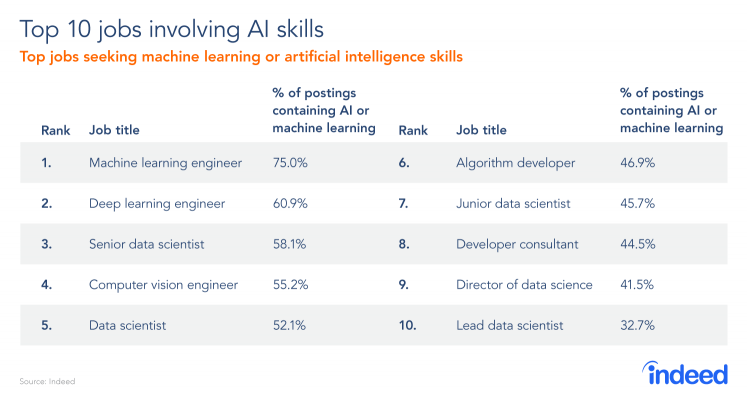
Source: Indeed
Salary Expectations in the Field of AI
Machine learning engineers are not only in high demand, but they are also the top earners among AI jobs.
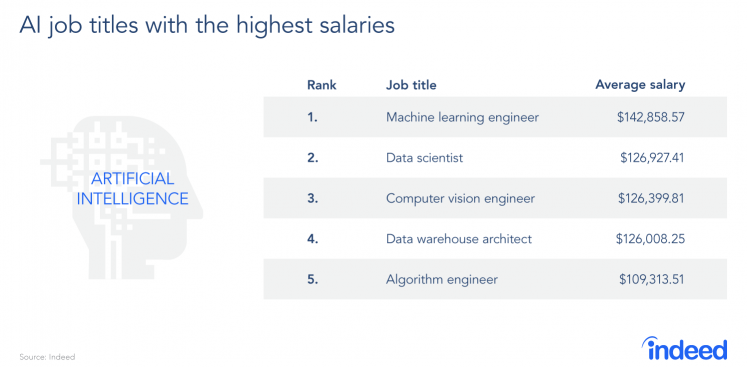
Remember, your location can significantly affect your salary in AI. Areas with a higher cost of living or tech hubs tend to offer higher pay.
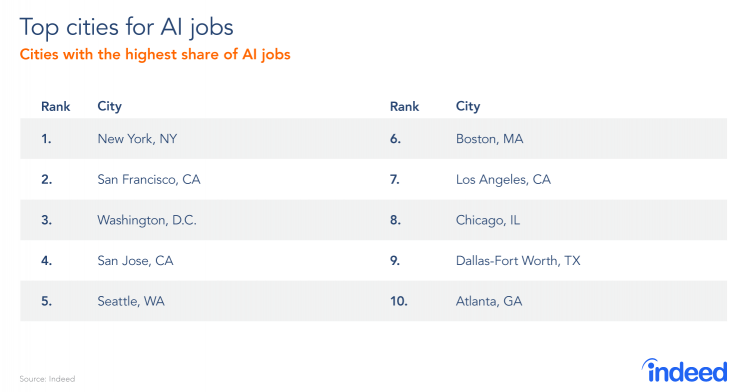
Opportunities in the AI field are everywhere. And as technology grows and changes, so does the pay scale. What we see today might just be the beginning.
Educational Background and Certifications for AI Careers
Gaining entry into the AI world isn’t a simple task. You’ll need more than just an interest; you’ll need specific qualifications.
Degree Programs for Aspiring AI Professionals
A degree in computer science, data science, or a related field is usually where most people start their journey to becoming an AI professional. EdX offers online courses that can help jumpstart your education from renowned universities like Harvard and MIT.
Courses focus on programming languages such as Python and Java, essential tools in any aspiring AI expert’s toolkit. Subjects like machine learning and deep learning form part of these curriculums too.
Certification Courses for Skill Enhancement
Beyond degrees, certification programs offer focused training that enhances one’s skill set further. Coursera provides numerous specialized certifications, helping learners acquire skills pertinent to job roles within this domain.
Say you’re interested in natural language processing (NLP). There’s a course specifically designed to give you the know-how.
The Importance of Practical Experience
Theoretical knowledge forms the base but practical experience is what truly prepares you for real-world challenges. Kaggle competitions, internships, and actual projects bear significant weight when it comes to landing your dream job in artificial intelligence.
Required Skills for Pursuing a Career in AI
To make your mark in the AI field, you’ll need a mix of technical and soft skills.
Technical Skills
The tech side of things can seem daunting, but strong technical skills can be a huge plus if you’re looking to break into this sector.
Data Analysis: This is key as most AI systems learn from data. You should be able to understand and interpret complex data sets. Courses like these on Coursera can give you the right start.
Coding: Coding is crucial for implementing algorithms or creating neural networks. Python is widely used due to its simplicity. Codecademy’s course could help beginners get their feet wet with Python coding.
Soft Skills
Tech isn’t everything. To truly excel, work on these ‘people’ skills too.
Critical Thinking: This helps when designing solutions that solve real-world problems effectively using AI technologies.
Persistence: A career in AI requires continuous learning because this field changes rapidly – so tenacity pays off.
Nurturing Your Skillset
Beyond these specifics, never underestimate the power of curiosity and creativity – they’ll often lead you down paths less traveled by others; opening up unique opportunities within this exciting realm called artificial intelligence.
How to Prepare for a Career in Artificial Intelligence
Now is the perfect moment to plunge into the realm of AI. But where do you start? Well, let me guide you through it.
Gaining Relevant Experience
The first step is to gain relevant experience. A fantastic way to start is by practicing data analysis and programming with languages such as Python or R. Platforms such as Kaggle give an excellent opportunity for practical learning.
You might also want to consider working on personal projects or contributing to open-source platforms. This will not only boost your skills but also help build a portfolio that can showcase your capabilities.
Acing Networking
Besides technical knowledge, networking plays a crucial role in carving out an AI career path. Attend conferences and seminars related to AI; these are fantastic places for meeting industry experts and potential employers.
Don’t forget about online communities either. Websites like AI Stack Exchange, offer ample opportunities for discussion and problem-solving with fellow enthusiasts around the globe.
Staying Updated With Latest Trends
To stay competitive in this fast-paced field, you must keep up-to-date with the latest trends. Following leading tech blogs like TechCrunch, subscribing to podcasts such as ‘The AI Alignment Podcast’, or taking part in webinars can provide invaluable insights into recent advancements in AI technology.
Challenges and Opportunities in AI Careers
The journey to a job in artificial intelligence is full of thrilling prospects as well as difficulties. Let’s explore the opportunities and challenges of AI careers.
Opportunities Galore
In this thriving field, there are countless AI job opportunities for professionals who are eager to make their mark. From developing sophisticated algorithms to designing human-like robots, there’s an endless list of fascinating projects you can work on.
Not only that but with companies increasingly seeking out AI specialists, job security isn’t something you’ll lose sleep over. Demand for AI roles has been skyrocketing across sectors like healthcare, finance, and e-commerce.
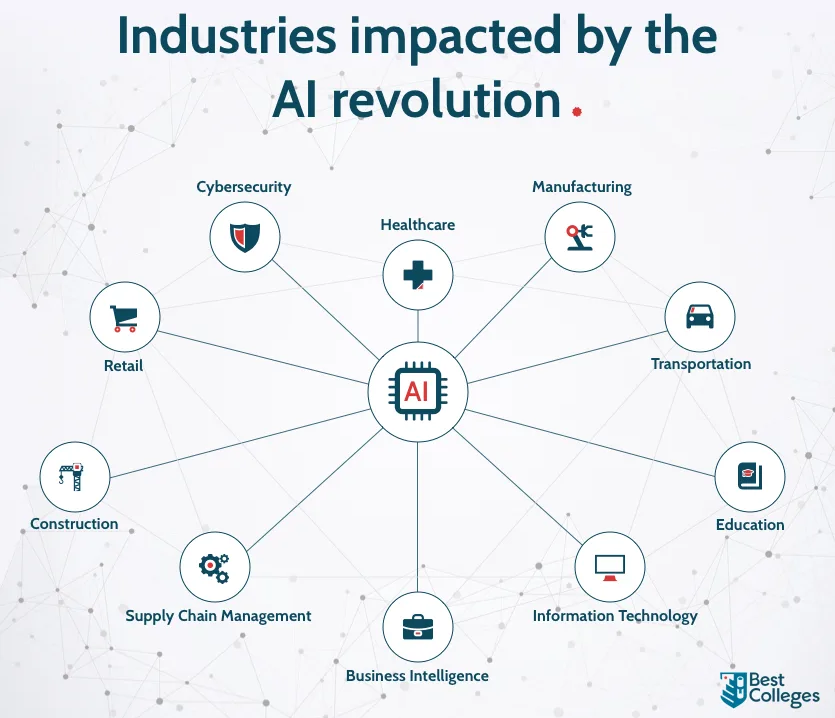
Infographic from Best Colleges
Navigating Challenges
Starting a career in AI can be an exciting journey, but like any field, it comes with its own set of challenges. Let’s dive into a few of them.
Complexity of the Field: AI is a vast and evolving field that encompasses various sub-domains like machine learning, deep learning, natural language processing, and more. The sheer complexity can be overwhelming for beginners.
Steep Learning Curve: Having a solid foundation in mathematics, particularly statistics and linear algebra, is essential. Programming skills, often in languages like Python, are also crucial. If you’re not already comfortable with these, it might take some time to get up to speed.
Interdisciplinary Skills: AI often requires collaboration between professionals with different expertise, including domain experts and business analysts. Developing interdisciplinary skills and the ability to communicate complex technical concepts to non-technical stakeholders is crucial.
Competition: The field of AI is competitive. Many talented individuals are working in the domain, and breaking into the industry can be tough. Networking and showcasing your skills through projects and contributions to the community can help.
Continuous Learning: AI is always advancing, and staying up-to-date with the latest technologies and techniques is crucial. Continuous learning is practically a job requirement, but it’s also what keeps the field dynamic and interesting.
Computational Resources: Training complex AI models can be computationally intensive. Not everyone has access to high-performance computing resources, and this can be a limitation for certain projects.
Ethical Considerations: As AI becomes more integrated into various aspects of society, ethical concerns are becoming increasingly important. Understanding and navigating the ethical implications of AI decisions and applications is a growing challenge.
Despite these roadblocks, the field of AI is incredibly rewarding. It’s at the forefront of technological innovation, and the demand for AI professionals continues to grow. Don’t be discouraged by the hurdles; view them as part of the adventure! Remember, every expert was once a beginner.
FAQs – AI Job Opportunities
What is the career opportunity with AI?
Career opportunities in AI are vast and varied, ranging from machine learning engineers to data scientists. It’s a growing field that promises exciting roles across industries.
Which AI jobs are in demand?
Jobs like Machine Learning Engineers, Data Scientists, and AI Architects are hot right now. Companies need folks who can leverage AI to solve complex problems.
Is a career in AI worth it?
Absolutely. A career in AI offers competitive salaries and the chance to work on cutting-edge technology. Plus, this field has plenty of room for growth.
How do I get a job in AI?
To snag an AI gig, you’ll need strong math skills and programming know-how plus expertise in algorithms and neural networks. Solid real-world experience also gives you an edge.
Conclusion
AI job opportunities? They’re here and they’re real.
The AI wave is not just about tech disruption; it’s also creating a plethora of career paths. So, you need to be ready!
High demand for AI skills across sectors? Absolutely!
Solid salary expectations in the field? You bet!
You’ve learned that technical prowess is key, but don’t forget those soft skills either. Your educational background and certifications matter too.
Preparation starts now – networking, gaining relevant experience, staying updated with trends … all these steps will put you ahead of the curve.
Ready to start an amazing career in AI? BrandWell can help you build an impressive resume! With generative AI, all you have to do is input your career details and you’ll be on your way to landing your dream job in artificial intelligence.